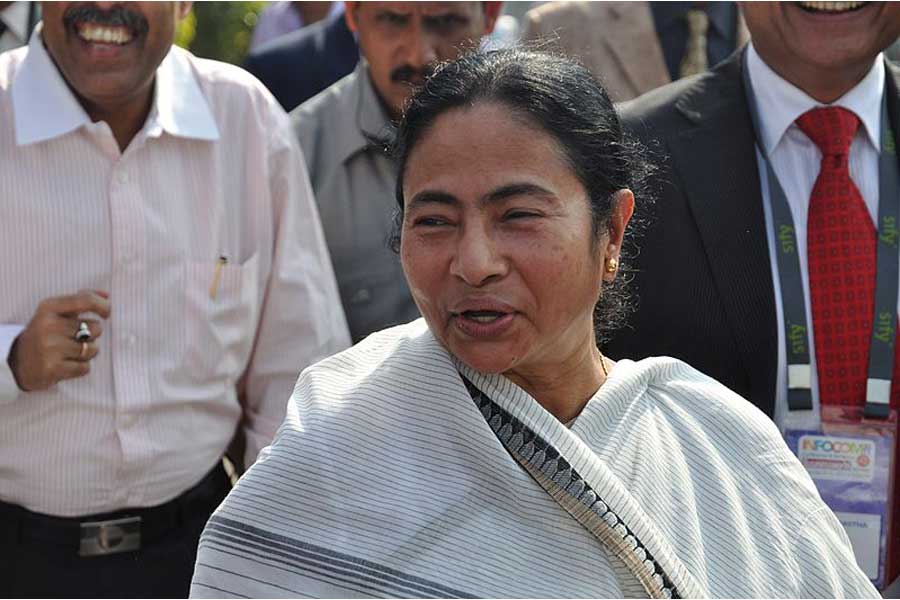There is every reason to believe that Trinamool Congress (TMC) leader Mamata Banerjee is sparing no tricks in her book to provoke the BJP-led Centre into dismissing her Government. Her systematic public humiliation of Bengal Governor, Jagdeep Dhankhar, is only one element in her overall larger anti-centre strategy.
Kolkata-based observers agree that both sides—the ruling TMC and the Bharatiya Janata Party (BJP) leaders—are well aware of the subtle political factors at play in Bengal. The BJP leaders know well that given the present realities prevailing in Bengal and the existing balance of political forces, the TMC needs a big shot in the arm to do well in the 2021 Assembly polls. As present, it is caught on a sticky wicket. For the TMC, only a BJP defeat, nothing less, will ensure its survival. After the 2019 Lok Sabha polls, defeating the BJP has turned into an existential challenge for the TMC.
The best option for the TMC is therefore , to provoke—if necessary, to contrive—some kind of conflict with Delhi, predicated on any ‘ideology’ or’ principle’, real or fancied. Nothing appeals more to Bengali voters more than standing up for the ‘victim’, the supposed underdog.
Referring to the extremely absorbing encounter currently building up between the TMC and the BJP, most observers arrive at three broad generalizations. First, the state will see a very keen razor’s edge Assembly election in 2021; there is almost no possibility for the ruling TMC to reprise its impressive victories of 2011 or 2016; it may emerge as the first party, but well short of a majority.
Second, the BJP will emerge as a close runner up, as the marginalisation of the Congress/Left camps continues unabated, despite their desperate attempts to recover their lost relevance.
Third, in the worst case scenario for the BJP, the TMC will still form a coalition government with help from the Congress/Left camp, or by encouraging defections from the BJP. Were this to happen, the potential for subsequent possibilities is endless, depending on the post-election behaviour of the TMC’s new allies. The latter may even insist that Mamata Banerjee does not head the coalition, given her hectoring ways within her own party as well as with the opposition.
Before engaging in speculation on what could be the Bengal post-poll scenario in 2021, the question that needs to be addressed now is whether the centre will be forced to take some kind of action against the ruling TMC government. As things stand, the prospects for such an eventuality cannot be ruled out.
The major reason is that the delicate arena of the highly nuanced federal/state relationship that proudly survives in India, has been badly disturbed as the TMC and the BJP continue their battle. The low level of rancour and mutual bitterness on display has broken all past records, to the point where even normal civil courtesies are no longer observed at public functions.
State Governor, Dhankar, complains that the Chief Minister did not acknowledge his greetings at the state-sponsored Durgapuja Bisarjan ceremony, (bizarrely called the greatest carnival in the world). The TV footage supports his assertion. Not one to take a public snub lying down, Dhankhar royally ignored the Chief Minister and her team, as they lined up while he exited the state Assembly with his entourage after a function, a few days later. Dishonours even.
There is a strong case for arguing that by unilaterally opting out of major central development schemes and initiatives, not to mention its openly hostile behavior against central agencies like the CBI and ED, the Bengal Government has disrupted the normal working Centre-State relationship. Such extreme anti-centre hostility has not been seen from other non-BJP ruled states vis-à-vis their dealings with Delhi. The catalogue of Bengal’s declared non co-operation with the centre/other states is a long one. Only a few examples are listed below.
Kolkata’s refusal of permission for central Ministers and Chief Ministers from other states to visit Bengal on election campaign or party meetings; refusal to submit routine annual crime statistics and related data to the Centre; refusal to allow the NIA to investigate terrorist attacks and incidents; refusal to allow senior state officials to respond to any queries from central ministers /agencies; refusal to make available suitable land needed for expansion of national highways, the railways, air services, for border fencing; refusal to participate in public health improvement schemes, mass education programmes, farmers’ insurance schemes; refusal to co-operate with the CBI, the ED or Customs officials, who have been threatened by state and Kolkata police officials; refusal to implement central laws like the CAA and the NRC.
In many such instances, peoples’ interest has been deliberately sacrificed to secure illusionary political mileage. The current war of words between State Governor (who has been mostly raising questions on poor governance and violation of procedures without receiving any answer) and the TMC government is merely another item in the same dismal narrative.
The desperation of the Chief Minister became clear when she challenged the centre to dismiss her government in one of her rallies, declaring that the CAA and the NRC would be done in Bengal only over her ‘dead body.’
After nearly four months, the Governor has now publicly called upon the Chief Minister, the Chief Secretary and other officials to meet and apprise him of major developments in the state. According to his powers defined in the Constitution, he can do this. As one observer put it, Dhankhar has survived his baptism by fire. A lesser person would have quit by now.
The battle over the violation of Constitutional norms and other aspects of governance in centre/state interactions has every likelihood of turning into a major legal dispute that may well end up at the Supreme Court. Such issues will not be decided there on the basis of arguments put up at mass rallies or street marches conducted by the TMC or the BJP. In any legal confrontation, experts feel the Centre will start with an edge over the State.







